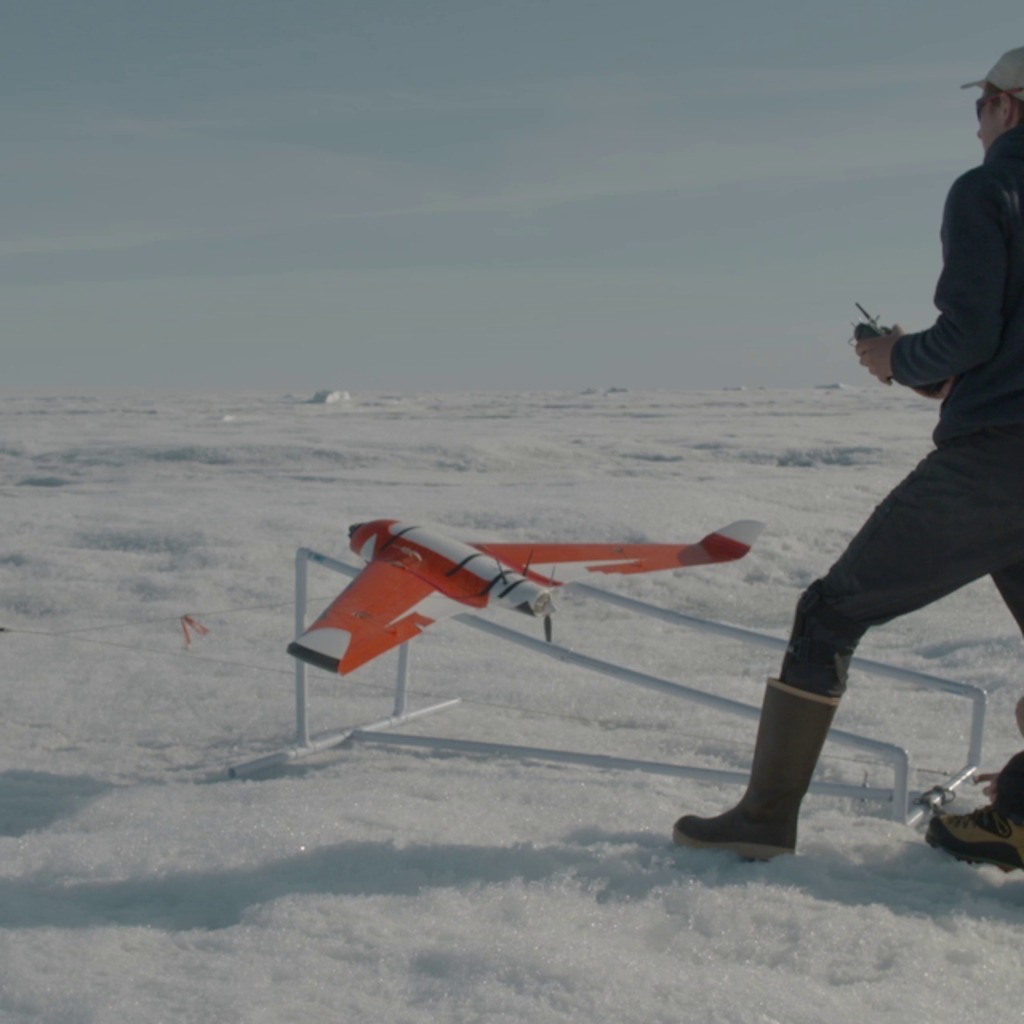NASA GSFC MASCON Solution over Antarctica from Jan 2004 - Jun 2014
Visualization of the mass change over the Antarctic Ice Sheet from January 2004 through June 2014. The color on the surface of the ice sheet shows the change in equivalent water height while the graph overlay shows the total accumulated change in gigatons.
GRACE, NASA's Gravity Recovery and Climate Experiment, consists of twin co-orbiting satellites that fly in a near polar orbit separated by a distance of 220 km. GRACE precisely measures the distance between the two spacecraft in order to make detailed measurements of the Earth's gravitational field. Since its launch in 2002, GRACE has provided a continuous record of changes in the mass of the Earth's ice sheets.
This animations shows the change in the mass of the Antarctic Ice Sheet between January 2004 and June 2014 as measured by the pair of GRACE satellites. The 1-arc-deg NASA GSFC mascon solution data was resampled to a 5130 x 5130 data array using Kriging interpolation. A color scale was applied in the range of +250 to -250 centimeters of equivalent water height, where blue values indicate an increase in the ice sheet mass while red shades indicate a decrease. In addition, a graph overlay shows the running total of the accumulated mass change in gigatons.
The data is first shown over the entire Antarctic Ice Sheet with the graph showing the total change in gigatons for the full ice sheet. The camera then zooms to focus on the West Antarctic Ice Sheet, the region to the West of the Trans-Antarctic mountains, where much of the loss has taken place. The animation is shown again over this region while the graph of ice loss presents the change over West Antarctica alone. Regions composed of the floating ice shelves, and thus not a part of the Antarctic Ice Sheet, are shown in a pale shade of green.
Technical Note: The glacial isostatic adjustment signal (Earth mass redistribution in response to historical ice loading) has been removed using the ICE-6G model (Peltier et al. 2015).

A print-resolution image showing the accumulated change in equivalent water height over the Antarctic Ice Sheet from January 2004 through June 2014. A graph of the Antarctic Ice Sheet's total change in gigatons is overlaid on the image.

A print-resolution image showing the accumulated change in equivalent water height over the West Antarctic Ice Sheet from January 2004 through June 2014. A graph of the West Antarctic Ice Sheet's total change in gigatons is overlaid on the image.
The same movie as shown above without the reference to the data source: NASA GSFC NASCON Solution.
The background visualization without the graph overlay or labels.

The colorbar alone with transparency

The graph overlay of the mass change in gigatons with transparency along with all text labels, colorbar and date.

The date overlay alone with transparency
Credits
Please give credit for this item to:
NASA's Scientific Visualization Studio
-
Visualizer
-
Cindy Starr
(Global Science and Technology, Inc.)
-
Cindy Starr
(Global Science and Technology, Inc.)
-
Scientist
- Scott Luthcke (NASA/GSFC)
-
Chief scientist
- Bryant Loomis (SGT)
-
Producer
- Patrick Lynch (Wyle Information Systems)
-
Technical support
- Laurence Schuler (ADNET Systems, Inc.)
- Ian Jones (ADNET Systems, Inc.)
Series
This page can be found in the following series:Related papers
Luthcke, S.B., T.J. Sabaka, B.D. Loomis, A.A. Arendt, J.J. McCarthy, J. Camp (2013), Antarctica, Greenland and Gulf of Alaska land ice evolution from an iterated GRACE global mascon solution, J. Glac., Vol. 59, No. 216, 613-631, doi:10.3189/2013jJoG12j147.
Peltier, W.R., Argus, D.F. and Drummond, R. (2015) Space geodesy constrains ice-age terminal deglaciation: The global ICE-6G_C (VM5a) model.
J. Geophys. Res. Solid Earth, 120, 450-487, doi:10.1002/2014JB011176.
Luthcke, S.B., T.J. Sabaka, B.D. Loomis, A.A. Arendt, J.J. McCarthy, J. Camp (2013), Antarctica, Greenland and Gulf of Alaska land ice evolution from an iterated GRACE global mascon solution, J. Glac., Vol. 59, No. 216, 613-631, doi:10.3189/2013jJoG12j147.
Peltier, W.R., Argus, D.F. and Drummond, R. (2015) Space geodesy constrains ice-age terminal deglaciation: The global ICE-6G_C (VM5a) model.
J. Geophys. Res. Solid Earth, 120, 450-487, doi:10.1002/2014JB011176.
Datasets used
-
Mascon Solution [Gravity Recovery and Climate Experiment (GRACE): Star Camera]
ID: 666This dataset can be found at: http://www.csr.utexas.edu/grace/spacecraft/
See all pages that use this dataset -
Bedmap2 (Antarctic Bedmap2 Topography)
ID: 786
Note: While we identify the data sets used on this page, we do not store any further details, nor the data sets themselves on our site.
Release date
This page was originally published on Wednesday, August 26, 2015.
This page was last updated on Sunday, December 15, 2024 at 12:05 AM EST.
